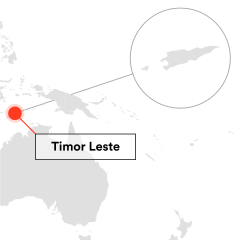What will your programme strategy be?
Develop your programme strategy
Key steps

Key steps
Develop your programme strategy
Case Studies

Developing a country programme document in Timor-Leste
Spotlight Initiative
The Timor-Leste country programme document is a comprehensive 162-page report laying out the strategy for Spotlight Initiative in Timor-Leste. It contains the following:
- Situational analysis on violence against women and girls in Timor-Leste, highlighting key statistics, challenges and the need for targeted interventions under each of the six pillars.
- Programme strategies and a Theory of Change which outlines a comprehensive approach to implementation of interventions across the six Pillars/Outcome Areas. It includes a description of the Results Chain, the scale and scope of the work to be undertaken in each Pillar, target groups, estimated costs, and the implementation approaches to be used.
- Governance arrangements, including details of the Country Programme Steering Committee (CP-SC). It also includes an accountability section with details on the Resident Coordinator, Resident Coordinator’s Office and the UN Recipient Organisations (RUNOs).
- Implementing agencies and partners, including UN agencies, government partners, civil society, academic institutions, private sector, faith-based and traditional organisations, and municipal-level stakeholders.
- Partnerships arrangements, including the Interim Civil Society Reference Group.
- A section outlining an intersectional approach to discrimination maps out the relevant ‘at-risk’ groups identified in Timor Leste, including survivors of violence, girls aged 12-24, women and girls with disabilities, women in vulnerable employment, the LGBTI community, and girls who marry before 18.
- A risk management table which outlines contextual, programmatic, institutional and fiduciary risks and how these will be managed.
- Details of consistency and alignment with other programmes operating in Timor-Leste, with a particular focus on EVAW programmes, or initiatives with EVAW components.
- A Monitoring and Evaluation section with some brief initial details (e.g. that a comprehensive baseline survey will be initiated by September 2019), although noting that a full M&E framework and strategy will be developed.
- An 'Innovation' section identifies some of the suggested programmatic innovations (e.g. mobile courts and youth paralegals) and operational innovations (e.g. the ‘One UN’ approach).
- Knowledge management is recognised as important with knowledge generation and exchange explicitly proposed under Pillar 1, Pillar 3, and Pillar 6.
- Communication and visibility objectives are briefly outlined, as well as the role of the Spotlight Communications Task Force.

Region:
Pacific

Stakeholders:
Local government





